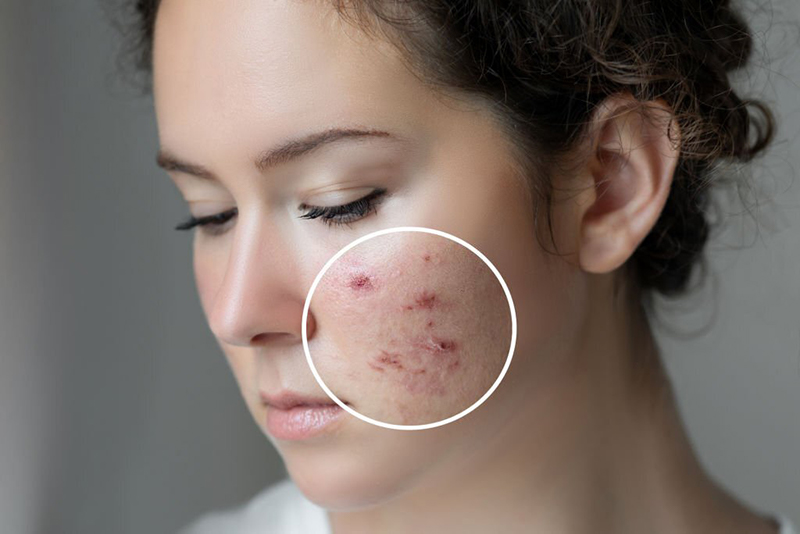Acne and spots are caused by a variety of factors.
Acne is caused by skin inflammation, which mostly affects the sebaceous glands, which generate sebum, the natural oil that keeps the skin moisturized. Excess sebum and dead skin cells clog the follicles of the skin (appearing as blackheads). These clogged pores provide fertile habitat for infection and inflammation to spread. Papules (red bumps) and pustules are the two types of spots that appear (whiteheads). Although there are a variety of causes that might cause acne, such as hormonal, nutritional, and environmental factors, gut health should also be taken into account. probioticseverything.comprobiotics p acnes
What role does gut health play in skin health, and why?
The health of the gut microbiome, a collection of bacteria that dwell in our gut, has a significant impact on gut health. The gut microbiota has far-reaching implications on gut health as well as the rest of the body. Many common skin illnesses, such as eczema, psoriasis, and acne, have been linked to it. probioticseverything.comprobiotics p acnes
The gut-skin axis is a mechanism via which the gut can influence skin health. Because the stomach contains 70% of our immune cells, our gut microorganisms can influence immune cell function. This should result in more anti-inflammatory messengers (cytokines) being produced and fewer pro-inflammatory cytokines being produced. However, dysbiosis, or an imbalance in the gut microbiota between friendly and dangerous bacteria, is common in acne and can negatively affect our immune responses. You might want to read the article What is Dysbiosis? for additional information. probioticseverything.comprobiotics p acnes
The spaces between the cells lining the gut get bigger in response to dysbiosis, inflammation, or infection, resulting in “leaky gut.” Probiotics, or beneficial gut bacteria, prevent the growth of pathogens, or dangerous bacteria, and strengthen the gut wall lining. However, when pathogen overgrowths damage the gut wall, the contents of the stomach leak through this unusually permeable lining, causing an immune cell response and producing inflammation in the body, which may lead to acne formation. Bacterial by-products can also get past the gut wall lining and into the bloodstream, where they can dry and stiffen the skin. probioticseverything.comprobiotics p acnes
The microbiome of the skin
The skin microbiome, like the gut microbiome, is colonized by its own group of bacteria. Staphylococci, Corynebacteria, Propionibacterium, Brevibacterium, and Micrococci are some of the most common bacteria found on the skin. The makeup of the skin microbiome differs from person to person depending on factors such as age, gender, and environment. probioticseverything.comprobiotics p acnes
Acne is caused by the bacteria Propionibacterium acnes colonizing the skin, which can cause an inflammatory reaction. Antibiotics are the initial line of treatment for acne vulgaris. Antibiotic resistant strains of Propionibacterium acnes have been on the rise in recent years, and antibiotics can have unpleasant side effects. Acne sufferers may turn to alternate solutions like probiotics to help manage their acne or mitigate the side effects of antibiotics. probioticseverything.comprobiotics p acnes
Is it true that probiotics can assist with acne?
Probiotics are gaining popularity as a treatment for acne and other skin issues, but how can they help? Let’s have a look at the various ways they could be beneficial. probioticseverything.comprobiotics p acnes
Reduce inflammation — Because acne is an inflammatory disorder, Lactobacilli and Bifidobacteria strains have been demonstrated to reduce the release of pro-inflammatory cytokines such as TNF-, IL-6, and IL-8 while increasing the release of anti-inflammatory cytokines such as IL-10. probioticseverything.comprobiotics p acnes
Reduce oxidative stress – As a result of metabolic activities in the body, the body naturally creates free radicals. Antioxidants in our diets, such as those found in brightly colored fruits and vegetables, fight free radicals. However, oxidative stress occurs when too many free radicals are created and not enough antioxidants are present to counteract their effects. Inflammation is caused by an overabundance of free radicals. There is an increase in oxidative stress and oxidative stress indicators such hydroperoxide in acne. Specific probiotic strains have also been shown to lower oxidative stress markers such as hydroperoxide. probioticseverything.com

